-
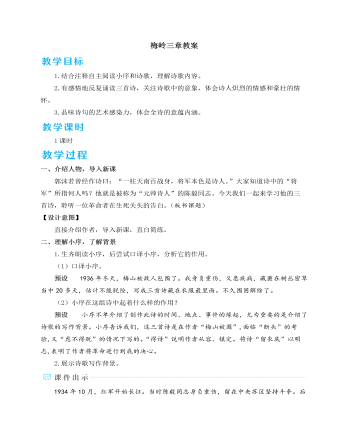
人教部编版语文九年级下册梅岭三章教案
(1)看题目。题目中蕴含着诸多信息,如时间、地点、人物、事件以及诗人的心情、诗歌的意境、诗歌的类型等。抓住这一切入点,有助于我们理解诗歌的思想感情。(2)看作者。作品是作者思想情感的具体化,所以,要准确理解诗词,把握作品的思想感情,就不能脱离作者孤立地臆断。作者的生平、写作风格、思想等等,无不影响着作者的情绪,所以,在鉴赏作品时,首先要了解作者的相关背景等。(3)看时代。把握时代风貌特征,把诗歌放在时代背景下评析,才能准确领悟其蕴含的思想感情。(4)看意象。诗歌的创作讲究含蓄、凝练。诗人的抒情往往不是情感的直接流露,而是注重弦外之音、言外之意。写景则借景抒情,咏物则托物言志。因此意象也就是作者的主观感情与客观物象的完美结合,是诗人情感显现的载体。把握诗中的意象,就能参悟意境,理解诗中蕴含的情感。
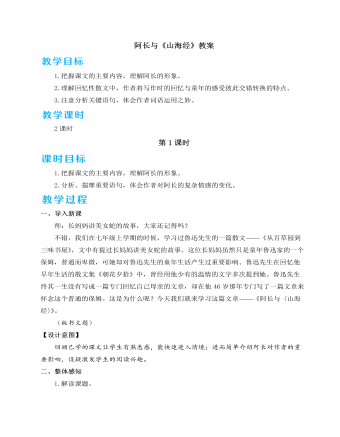
人教部编版七年级下册阿长与《山海经》教案
四、总结存储1.教师总结。纵观作者对阿长形象的刻画,犹如一部连续剧。从“喜欢切切察察”,对“我”过分看管,到睡相粗俗;从“懂得许多规矩”,特别是“元旦的古怪仪式”,到给“我”讲长毛的故事,再到“谋害”隐鼠,多侧面多角度地展现出阿长的个性特点:粗俗好事,迷信无知,却又乐天安命,简单率性。直到阿长给“我”买来《山海经》,先抑后扬的表达效果才充分显现,阿长纯朴善良、仁厚慈爱的品格在前文的衬托下显得格外闪光。而文章末尾,作者饱含深情地祝祷,将全文情感推向高潮。2.课外练笔。在你的童年生活中,有没有像阿长这样给你留下深刻印象的普通人?你怎样看待他们的优缺点?谈一谈你的想法和感受。(200字左右)【设计意图】在学生对课文有了整体的认知之后,教师总结提升。然后要求学生发现生活中普通人的闪光点,发现人性美,并进行课外练笔,有利于学生在实践中巩固技能,以读促写,读写结合,不仅可以加深对课文内容的理解,还能锻炼学生的写作能力。
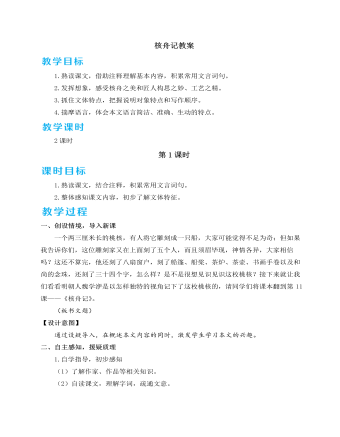
人教部编版语文八年级下册核舟记教案
《核舟记》是一篇说明性质的文言文,作者在完整而深刻地理解雕刻艺术构思的基础上,合理安排材料,运用简练生动的文字再现了“核舟”的形象。本课教学设计,注重学生自主学习、自主探究、自主拓展,教师予以有效指导。教学中的各个环节环环相扣,思路清晰。在自主学习的过程中,掌握文章的基本内容;在合作学习的过程中,完成文言知识卡片的归纳整理;在探究学习的过程中,通过“找一找”“品一品”两个环节,让学生深入到文本中进行赏析,感知核舟的奇巧,感悟雕刻者技艺的精巧和构思的精妙,学习作者行文的巧妙,体会到文章语言的简洁、准确和生动;在布置作业环节,联系课堂内外,有拓展延伸的阅读,有学以致用的练笔。整个教学设计适应了学生各种能力的发展需要,提高了学生的语文素养。疑难探究《核舟记》一般被视为说明文,但文中包含了大量的描写。对此应该如何理解?首先,说明文是今天我们按照记叙文、说明文、议论文三大文体分类为之做出的界定,而古人的文体分类中并无“说明文”一类,《核舟记》这种记物之文和记游、记亭台楼阁之文都属于“杂记”。
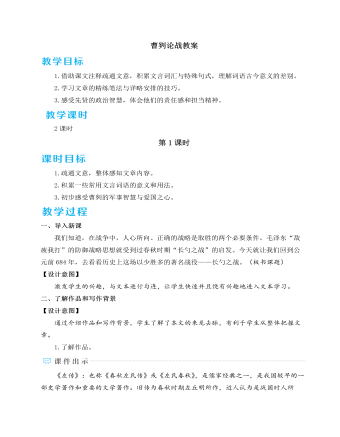
人教部编版语文九年级下册曹刿论战教案
开门见山,免去了君臣相见的繁文缛节的叙述;“齐人三鼓”一句,就包括了齐军的第一次和第二次击鼓进击而鲁军未出击的过程,也写出了齐军依仗数量上的优势企图取胜的急切心理;两个“可矣”写出了鲁军进军的情况;“辙乱”“旗靡”四个字就概括了齐军溃败的具体情况。文章抛开残酷的战争场面,无一字描写,仅一个“齐师败绩”写明战争结果。多四字句,如“曹刿请见”“牺牲玉帛”“一鼓作气”等,读来典雅端庄,辞约而意丰,言简而意明。疑难探究1.如何理解曹刿以平民身份而主动“论战”的行为?曹刿堪称中国古代平民政治家与军事家。他只是鲁国的一介平民,并非“肉食者”,本无机会参与国家大事的商讨和实施。但他凭借着一颗赤诚的爱国之心,积极参与抵御外敌入侵的政治谋划与军事行动,并创造了以弱胜强的战争奇迹。2.请试着从曹刿、鲁庄公、战争这三个角度分别用四个字对文章每一段内容进行概括。从曹刿的角度可以概括为:曹刿论战—曹刿参战—曹刿释疑。从鲁庄公的角度可以概括为:庄公将战—庄公实战—庄公问因。从战争的角度可以概括为:战前准备—战争过程—战胜原因。
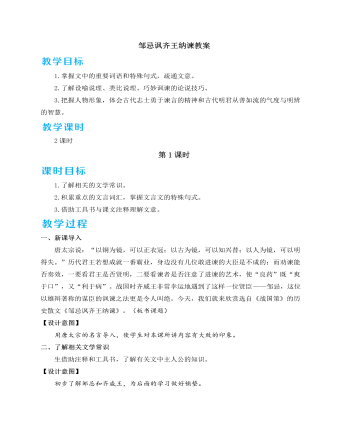
人教部编版语文九年级下册邹忌讽齐王纳谏教案
第二,《战国策》描写人物的性格和活动更加具体细致,也就更显得生动活泼。《左传》描写人物,大抵是简笔勾勒。第三,《战国策》所记的策士说辞,常常引用生动的寓言故事,这也是以文学手段帮助说理的方法。这些寓言,形象鲜明,寓意深刻,又浅显易懂,独立地看也是中国文学宝库中的璀璨明珠。疑难探究除了高超的语言艺术,邹忌劝谏成功还有哪些重要因素?除了高超的语言艺术,邹忌能劝谏成功,还有其他重要的因素。比如:这也与邹忌善于思考、分析的个性和他的担当、责任意识相关。邹忌关心国家大事,一心想寻找恰当时机劝谏齐王。他在生活中经历了“比美”经历,能够深入思考、分析,体察各人的情状心理,并敏锐地由个人体验联系到国家大事,想到齐王所受之蔽,于是果断地进行劝谏。这也离不开齐王广开言路的胸襟和果断行事的理政智慧。齐王听了邹忌的劝谏,马上“下令”,并且分上、中、下三种不同层面赏赐,立刻实施,表现出一位贤明君主的特点。
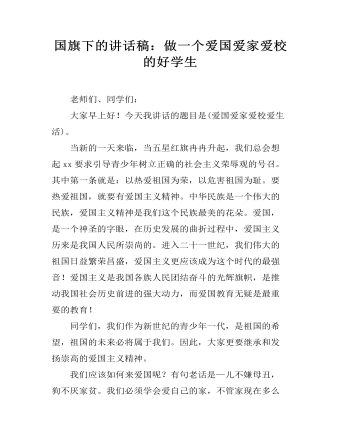
国旗下的讲话稿:做一个爱国爱家爱校的好学生
老师们、同学们:大家早上好!今天我讲话的题目是(爱国爱家爱校爱生活)。当新的一天来临,当五星红旗冉冉升起,我们总会想起xx要求引导青少年树立正确的社会主义荣辱观的号召。其中第一条就是:以热爱祖国为荣,以危害祖国为耻。要热爱祖国,就要有爱国主义精神。中华民族是一个伟大的民族,爱国主义精神是我们这个民族最美的花朵。爱国,是一个神圣的字眼,在历史发展的曲折过程中,爱国主义历来是我国人民所崇尚的。进入二十一世纪,我们伟大的祖国日益繁荣昌盛,爱国主义更应该成为这个时代的最强音!爱国主义是我国各族人民团结奋斗的光辉旗帜,是推动我国社会历史前进的强大动力,而爱国教育无疑是最重要的教育!同学们,我们作为新世纪的青少年一代,是祖国的希望,祖国的未来必将属于我们。因此,大家更要继承和发扬崇高的爱国主义精神。
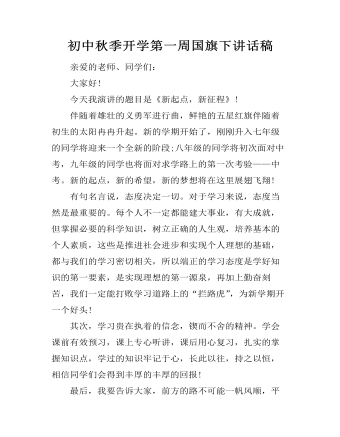
初中秋季开学第一周国旗下讲话稿
亲爱的老师、同学们:大家好!今天我演讲的题目是《新起点,新征程》!伴随着雄壮的义勇军进行曲,鲜艳的五星红旗伴随着初生的太阳冉冉升起。新的学期开始了,刚刚升入七年级的同学将迎来一个全新的阶段;八年级的同学将初次面对中考,九年级的同学也将面对求学路上的第一次考验——中考。新的起点,新的希望,新的梦想将在这里展翅飞翔!有句名言说,态度决定一切。对于学习来说,态度当然是最重要的。每个人不一定都能建大事业,有大成就,但掌握必要的科学知识,树立正确的人生观,培养基本的个人素质,这些是推进社会进步和实现个人理想的基础,都与我们的学习密切相关,所以端正的学习态度是学好知识的第一要素,是实现理想的第一源泉,再加上勤奋刻苦,我们一定能打败学习道路上的“拦路虎”,为新学期开一个好头!
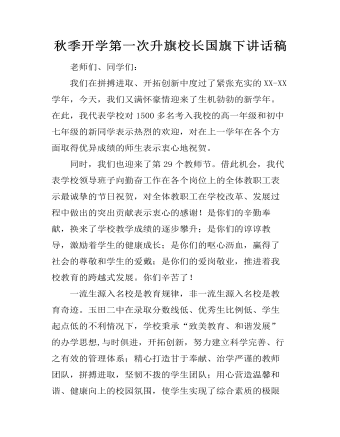
秋季开学第一次升旗校长国旗下讲话稿
老师们、同学们:我们在拼搏进取、开拓创新中度过了紧张充实的XX-XX学年,今天,我们又满怀豪情迎来了生机勃勃的新学年。在此,我代表学校对1500多名考入我校的高一年级和初中七年级的新同学表示热烈的欢迎,对在上一学年在各个方面取得优异成绩的师生表示衷心地祝贺。同时,我们也迎来了第29个教师节。借此机会,我代表学校领导班子向勤奋工作在各个岗位上的全体教职工表示最诚挚的节日祝贺,对全体教职工在学校改革、发展过程中做出的突出贡献表示衷心的感谢!是你们的辛勤奉献,换来了学校教学成绩的逐步攀升;是你们的谆谆教导,激励着学生的健康成长;是你们的呕心沥血,赢得了社会的尊敬和学生的爱戴;是你们的爱岗敬业,推进着我校教育的跨越式发展。你们辛苦了!一流生源入名校是教育规律,非一流生源入名校是教育奇迹。玉田二中在录取分数线低、优秀生比例低、学生起点低的不利情况下,学校秉承“致美教育、和谐发展”的办学思想,与时俱进,开拓创新,努力建立科学完善、行之有效的管理体系;精心打造甘于奉献、治学严谨的教师团队,拼搏进取,坚韧不拨的学生团队;用心营造温馨和谐、健康向上的校园氛围,使学生实现了综合素质的极限增值,获得了较其他学校学生更大幅度的成绩提升,XX年二本上线468人,上线率位居唐山市同类学校第一名。成为我县三所高中在全市中学所在系列上线率最高、成绩最好的学校,并且实现了连续六年的跨越式增长。

新人教版高中英语必修3Unit 1 Festivals and celebrations-Discovering Useful Structure教学设计
4.That was an experience that frightened everyone. →That was _____________________. 答案:1. taking 2. being discussed 3. in the reading room 4. a frightening experienceStep 6 The meaning and function of V-ing as the predicative动词-ing形式作表语,它通常位于系动词后面,用以说明主语“是什么”或“怎么样”一种表示主语的特质、特征和状态, 其作用相当于形容词; 另一种具体说明主语的内容, 即主语等同于表语, 两者可互换。The music they are playing sounds so exciting. 他们演奏的音乐听起来令人激动。The result is disappointing. 结果令人失望。Our job is playing all kinds of music. 我们的工作就是演奏各种音乐。Seeing is believing. 眼见为实。Step 7 Practice1. It is ________(amaze) that the boy is able to solve the problem so quickly.2. Buying a car is simply _______(waste) money. 3. Please stop making the noise—it’s getting ________(annoy). 4. complete the passage with the appropriate -ing form.La Tomatina is a festival that takes place in the Spanish town Bunol every August. I think many food festivals are __________ because people are just eating. however, this festival is _________ because people don't actually eat the tomatoes. Instead, they throw them at each other! the number of people ________ part in this tomato fight, can reach up to 20,000, and it is a very __________ fight that lasts for a whole hour. The _______ thing is how clean Bunol is after the tomatoes are washed away after the fight. this is because the juice form tomatoes is really good for making surfaces clean!答案:1. amazing 2. wasting 3. annoying4. boring interesting taking exciting amazing

新人教版高中英语必修3Unit 1 Festivals and Celebrations-Listening &Speaking&Talking教学设计
The theme of this section is “Talk about festival activities and festival experiences”.Festival and holiday is a relaxing and interesting topic for students. This part talks about the topic from the daily life of students’. In the part A ---Listening and Speaking, there are three conversations among different speakers from three countries(Japan, Rio and China), where the speakers are participating in or going to participate in the festivals and celebrations. So listening for the relationship among them is a fundamental task. Actually, with the globalization and more international communication, it is normal for Chinese or foreigners to witness different festivals and celebrations in or out of China. In the Conversation 1, a foreign reporter is interviewing a Japanese young girl who just had participated in the ceremony of the Coming-of-Age Day on the street and asking her feeling about the ceremony and the afterwards activities. Conversation 2, Chinese girl Li Mei is witnessing the Rio Carnival for the first time, and her friend Carla gives her some advice on the costumes which enables her to match with the carnival to have a good time. Conversation 3, a Chinese guide is showing a group of foreign visitors around the Lantern Festival and introducing the customs of the festival to them. The three conversations have a strong vitality and insert the festival and cultural elements from different countries. So perceiving the festivals and cultures from different countries is the second task. At the same time, the scripts also insert the targeted grammar --- v-ing as attributive and predicative, which students can perceive and experience in a real context and make a road for the further study. That is the third task. In the Part B--- Listening and Talking, the theme is “Talk about festival experience”, which is the common topic in our daily conversations. During the conversation, Song Lin, a Chinese student, asked Canadian friend Max about how to spend Christmas. In the conversation, Song Lin talked about experience and the feelings during the Chinese Spring Festival, during which there are not only some enjoyable things but some unpleasant things. After the listening, perhaps students find there are some similarities between Christmas and the Chinese Spring Festival as there are some differences in the origins and celebrations. For example, people always visit friends and relatives, decorate their houses, have a big dinner together, chat and give presents to each other.

新人教版高中英语必修3Unit 3 Diverse Cultures-Discovering Useful Structure教学设计
Step 4 PracticeRead the conversation. Find out which words have been left out.Justin: Linlin, I’m going to Guizhou Province next month. I’m super excited! Any recommendations for places to visit?Linlin: Wow, cool! Guizhou is a province with a lot of cultural diversity. Places to visit...well, definitely the Huangguoshu Waterfall first.Justin: What’s special about the waterfall?Linlin: Well, have you ever heard of the Chinese novel Journey to the West ?Justin: Yes, I have. Why ?Linlin: In the back of the waterfall, you will find a cave, which is the home of the Monkey King.Justin: Really? Cool! I’ll definitely check it out.Linlin:And I strongly recommend the ethnic minority villages. You’ll find Chinese culture is much more diverse than you thought.Justin:Sounds great, thanks.Answers:Justin: Linlin, I’m going to Guizhou Province next month. I’m super excited! Do you have any recommendations for places to visit?Linlin: Wow, that’s cool! Guizhou is a province with a lot of cultural diversity. What are some places to visit in Guizhou ? Well, definitely the Huangguoshu Waterfall is the first place to visit in Guizhou Province.Justin: What’s special about the waterfall?Linlin: Well, have you ever heard of the Chinese novel Journey to the West ?Justin: Yes, I have heard of the Chinese novel Journey to the West . Why do you ask if I have heard of the Chinese novel Journey to the West?Linlin: In the back of the waterfall, you will find a cave, which is the home of the Monkey King from Journey to the West.Justin: That’s really true? It’s Cool! I’ll definitely check it out.Linlin:And I strongly recommend the ethnic minority villages on your trip to Guizhou Province. You’ll find Chinese culture is much more diverse than you thought it was.Justin:This all sounds great, thanks.

新人教版高中英语必修3Unit 5 The Value of Money-Listening &Speaking&Talking教学设计
4. A:We’d like to have someone to say a word at the beginning to welcome the group.B:↙Who?A:We thought that you or Dr.Johnson might do it.B用降调说Who,其意思是问,对方想让谁在开场时致欢迎词。Step 6 Pronunciation---Practice1. Listen to the short conversation and mark the intonation with ↗, ↙ or ↙, ↗. Then discuss with a partner what they intend to convey by using different intonation.Owner: You know what ?↗ It’s a million-pound bank note↙.Waiter 1: Really ?↗(question)Waiter 2: Really !↙(unbelievable and surprised)Waiter 3: Really ?!↙↗(first question then surprised)2. Listen to the conversations. Underline the parts that are stressed and mark the intonation. Then talk about the implied meanings of the responses with different intonations. Listen again and repeat.1) Henry: It’s a nice suit.Owner: Oh, it’s perfect!↙(The intonation means it is very suitable for Henry.)2) Henry: Well, that’s very kind of you.Owner: Kind, sir ?↗(what you said is not right) No, it’s kind of you. You must come whenever you want and have whatever you like. Just having you sit here is a great honour !!↙(welcome you to come again)3)Henry:Well, to be honest, I have none. Oliver:(happily) What luck!(excited) Brother↗, what luck!↙(It means “Didn’t you hear it?”)Henry: Well, it may seem lucky to you but not to me!↗(angry) If this is your idea of some kind of joke, I don’t think it’s very funny. Now if you’ll excuse me, I ought to be on my way.↙(If so, I would leave.)Roderick: Please don’t go↙...(hope Henry can wait for a moment)Part B Viewing and Talking---Describe people’s changing attitudes in a film clipStep 1 Before-listening---Tell the filmYou are going to watch part of the film The Million Pound Bank Note. Look at these photos and guess what happens in the film.

新人教版高中英语必修3Unit 5 The Value of Money-Listening &Speaking教学设计
Step 4: Listen again and decide if the following statements are true (T) or false (F).1 It was the first time Chen Liyan's story was reported. T口 F口2 Chen found 10,000 yuan in a small plastic bag in Taiyuan railway station口 F口3 Wang Zheng apologized to Chen because he couldn't offer her more money. T口 F口4 Chen took out a large loan to cure her daughter, T口 F口5 Wang set up a fundraising website for Chen's daughter after Chen told him about her situation. T口 F口Step 5:After listening, discuss the questions.1 What kind of person do you think Chen Liyan is?Chen Liyan is generous and honest because she returned a large sum of money to the owner.2 Did Chen return the money because she didn't need it?No. She returned the money because it was the right thing to do. Evidence for this is that she refused to accept the reward money because she felt that it had not been earned. 3 Is it common for people to do what Chen did?It depends on the culture. In some countries it is quite common to return money that has been found. In other countries, people believe "Finders are keepers!" 4 How did Wang Zheng feel about the return of his money?He must have been very happy and relieved to have gotten his money back. We know this because he thanked Chen repeatedly and even offered her a reward.5 Why did Ma Dongbao tell Wang about Chen's family?He must have had great sympathy for Chen and her daughter and wanted to help them.'We know this because he arranged help for them. 6 How did the news reporter feel about Chen's actions?The news reporter felt that it showed that money wasn't the most important thing in life. We know this because the reporter told us that this is what Chen believes. and then said, “that's a great attitude to take."

新人教版高中英语必修3Unit 5 The value of money-Reading and Thinking教学设计二
? Could you offer me some kind of work here?? I don’t want your charity, I just want an honest job.? Careless: I landed in Britain by accident.Step 7:Consolidation.? Find Henry? Roderick and Oliver were I .making a bet when they saw Henry, a poor young man. ? Know Henry? About a month ago, Henry was sailing and later he found himself carried out to sea by a strong wind. Fortunately, he 2.was spotted by a ship. And it was the ship that brought him to 3.England? Offer money to Henry ? Oliver and Roderick gave Henry a letter and told him that there was money in it. They 4.persuaded him to accept it, and made him 5.promise that it wouldn't be opened until 2 o'clock.Step 8:Language pointsa large amount of: a large quantity of; a great deal ofe.g. They bought a large amount of furniture before they moved their new house.make a bet: make an arrangement to risk money, etc. on an event of which the result is doubtful.e.g. We made a bet on the result of the match.permit sb to do something: allow somebody to do somethinge.g. My mother doesn’t permit me to ride in the street after it rained.by accident: as a result of chancee.g. I only found it by accident.stare at: look at somebody or something with the eyes wide open in a fixed gaze( in astonishment, wonder, fear, etc)to be honest: to tell you the truth; to be franke.g. To be honest, I don’t think we have a chance of winning.Step7 Homework:What do you think will happen to Henry? Will the bank-note help him or get him into trouble?

新人教版高中英语必修3Unit 1 Festivals and Celebrations-Reading and Thinking教学设计
The topic of this part is “Discover the reasons for festivals and celebrations.The Listening & Speaking & Talking part aims at talking about the experiences and feelings or emotions about the festivals and celebrations. This section aims at detecting the reason why the people celebrate the festivals, the time, the places, the types and the way of celebrations. It also explains why some traditions in the old celebrations are disappearing, like the firecrackers in the big cities and some new things are appearing like the prosperity of business or commerce. 1. Students can talk about what festivals they know and the reasons and the way of celebrating them.2. Students should learn the reading skills such as the headline and get the topic sentences, the structures of articles.3. Students can understand the past, the present situation of some festival around the world and why there are some changes about them. 4. Students can have the international awareness about the festivals.1. Students should learn the reading skills such as the headline and get the topic sentences, the structures of articles.2. Students can understand the past, the present situation of some festival around the world and why there are some changes about them.Step 1 Lead in---Small talkWhat festival do you like best ? Why ?I like the Spring Festivals because I can set off the fireworks, receive the lucky money and enjoy the Gala with my families.Step 2 Before reading---Pair workWhy do people celebrate different festivals ?The Spring Festivals is to celebrate the end of winter and the coming of spring and new life.The Mid-autumn Day is to celebrate the harvest and admire the moon.

新人教版高中英语必修3Unit 1 Festivals and Celebrations-Reading for writing教学设计二
Step 3 Analyzing article structureActivity 31. Teachers raise questions to guide students to analyze the chapter structure of this diary and think about how to describe the festival experience. (1)What should be included in the opening/body/closing paragraph(s)?(2)How did the writer arrange his/her ideas?(3)What kind of interesting details did the writer describe?(4)How did the writer describe his/her feelings/emotions during the event?2. Students read and compare the three sentence patterns in activity 2. Try to rewrite the first paragraph of the diary with these three sentence patterns. After that, students exchange corrections with their partners. Such as:●This was my first time spending three days experiencing the Naadam Festival in China’s Inner Mongolia Autonomous Region and it was an enjoyable and exciting experience. ●I'll never forget my experience at the Naadam Festival because it was my first time to watch the exciting Mongolian games of horse racing, wrestling, and archery so closely. ●I'll always remember my first experience at the Naadam Festival in China’s Inner Mongolia Autonomous Region because it was so amazing to spend three days witnessing a grand Mongolian ceremony. Step 4 Accumulation of statementsActivity 41. Ask the students to read the diary again. Look for sentences that express feelings and emotions, especially those with the -ing form and the past participle. Such as:● …horse racing, wrestling, and archery, which are all so exciting to watch. ● some amazing performances● I was surprised to see…● I was a little worried about. . . ● feeling really tiredOther emotional statements:●I absolutely enjoyed the archery, too, but the horse races were my favourite part. ●I'm finally back home now, feeling really tired, but celebrating Naadam with my friend was totally worth it. ●He invited me back for the winter to stay in a traditional Mongolian tent and cat hot pot. I can’t wait!2. In addition to the use of the -ing form and the past participle, the teacher should guide the students in the appreciation of these statements, ask them to memorize them, and encourage them to use them reasonably in writing practice.

新人教版高中英语必修3Unit 3 Diverse Cultures-Reading for Writing教学设计
The topic of this part is “Describe a place with distinctive cultural identity”.This section focuses on Chinese culture by introducing Chinatown, whose purpose is to show the relationship between the Chinese culture and American culture. The Chinese culture in Chinatown is an important part of American culture. Chinatown is an important window of spreading Chinese culture and the spirit homeland of oversea Chinese, where foreigners can experience Chinese culture by themselves.Concretely, the title is “Welcome to Chinatown!”, from which we can know that the article aims at introducing Chinatown. The author used the “Introduction--Body Paragraph--Conclusion” to describe the people, language, architecture, business, famous food and drinks and people’s activities, which can be a centre for Chinese culture and shows its unique charm.1. Read quickly to get main idea; read carefully to get the detailed information.2. Learn the characteristics of writing and language.3. Learn to introduce your own town according to the text.4. Learn to correct others’ writing.1. Learn the characteristics of writing and language.2. Learn to introduce your own town according to the text.Step 1 Lead in ---Small talkIn the reading part, we mentioned the Chinatown of San Francisco. How much do you know about Chinatown of San Francisco ?Chinatown is a main living place for Chinese immigrants, where you can see many Chinese-style buildings, costumes, operas, restaurants, music and even hear Chinese.Step 2 Before reading ---Predict the contentWhat is the writer’s purpose of writing this text ? How do you know ?From the title(Welcome to Chinatown) and some key words from the text(tourist, visit, visitors, experience), we can know the purpose of the text is to introduce Chinatown and show the relationship between Chinese culture and American culture.

新人教版高中英语必修3Unit 3 Diverse Cultures-Listening &Speaking&Talking教学设计
1. In Picture 1 and Picture 2, where do you think they are from? How do you know?From their wearings, we can know they are from ethnic minority of China--- Miao and Dong.Picture 1, they are playing their traditional instrument lusheng in their traditional costumes.Picture 2. the girls are Miao because they wear their traditional costumes and silver accessory.2. In Picture 3, can you find which village it is? What time is it in the picture?It is Dong village. It is at night. Step 2 While-listeningJustin met a new friend while traveling in Guizhou. Listen to their conversation and complete the summaries below.Part 1Justin and Wu Yue watched some Miao people play the lusheng. The instrument has a history of over 3,000 years and it is even mentioned in the oldest collection of Chinese poetry. Then they watched the lusheng dance. Justin wanted to buy some hand-made silver/traditional accessories as souvenirs. He was told that the price will depend on the percentage of silver. Part 2They will go to a pretty Dong minority village called Zhaoxing. they will see the drum towers and the wind and rain bridges. They may also see a performance of the Grand Song of the Dong people.Step 3 Post-listening---TalkingWork in groups. Imagine Justin is telling some friends about his trip to Guizhou. One of you is Justin and the rest of you are his friends. Ask Justin questions about his trip and experience. The following expressions may help you.

新人教版高中英语必修3Unit 3 Diverse Cultures-Reading and Thinking教学设计
Discuss these questions in groups.Q1: Have you ever been to a place that has a diverse culture ? What do you think about the culture diversity ?One culturally diverse place that I have been to is Harbin, the capital city of Heilongjiang Province. I went there last year with my family to see the Ice and Snow Festival, and I was amazed at how the culture as different to most other Chinese cities. There is a big Russian influence there, with beautiful Russian architecture and lots of interesting restaurants. I learnt that Harbin is called “the Oriental Moscow” and that many Russians settled there to help build the railway over 100 years ago.Q2: What are the benefits and challenges of cultural diversity ?The benefits: People are able to experience a wide variety of cultures, making their lives more interesting, and it can deepen the feelings for our national culture, it is also helpful for us to learn about other outstanding culture, which helps improve the ability to respect others. The challenges: People may have trouble communicating or understanding each other, and it may lead to disappearance of some civilizations and even make some people think “The western moon is rounder than his own.”Step 7 Post reading---RetellComplete the passage according to the text.Today, I arrived back in San Francisco, and it feels good (1) _____(be) back in the city again. The city succeeded in (2)_________ (rebuild) itself after the earthquake that (3)________ (occur) in 1906, and I stayed in the Mission District, enjoying some delicious noodles mixed with cultures. In the afternoon, I headed to a local museum (4)____ showed the historical changes in California. During the gold rush, many Chinese arrived, and some opened up shops and restaurants in Chinatown to earn a (5)_____ (live). Many others worked on (6)______ (farm), joined the gold rush, or went to build the railway that connected California to the east. The museum showed us (7)____ America was built by immigrants from (8)________ (difference) countries and cultures. In the evening, I went to Chinatown, and ate in a Cantonese restaurant that served food on (9)________(beauty) china plates. Tomorrow evening, I’m going to (10)__ jazz bar in the Richmond District. 答案:1. to be 2. rebuilding 3. occurred 4. that 5.living6. farms 7.how 8. different 9. beautiful 10. a

新人教版高中英语必修3Unit 4 Space Exploration-Discovering Useful Structure教学设计
The theme of the section is “Describe space facts and efforts to explore space”. Infinitives are one of non-finite verbs, as the subjects, objects, predicative, attributes and adverbials. This unit is about space exploration, which is a significant scientific activity, so every scientific activity has strong planning. Therefore, using the infinitives to show its purpose, explanations or restrictions is the best choice.1. Learn the structure, functions and features of infinitives.2. Learn to summarize some rules about infinitives to show purpose and modify.3. Learn to use infinitives in oral and writing English. 1. Learn the structure, functions and features of infinitives.2. Learn to summarize some rules about infinitives to show purpose and modify.3. Learn to use use infinitives in oral and writing English.Step 1 Lead in---Pair workLook at the following sentences and focus on the italicized infinitives. In pairs, discuss their functions. 1. I trained for a long time to fly airplanes as a fighter pilot..(作目的状语)2. As we all know, an astronaut needs to be healthy and calm in order to work in space..(作目的状语)3. First of all, you must be intelligent enough to get a related college degree..(作目的状语)4. Some scientist were determined to help humans realise their dream to explore space..(作定语)5. On 12 April 1961, Yuri Gagarin became the first person in the world to go into space..(作定语)Summary:1. 不定式的结构:to+do原形。2. 分析上面的句子,我们知道在描述太空探索时,动词不定式不仅可以用来表目的,还可以用来作定语,表修饰。






